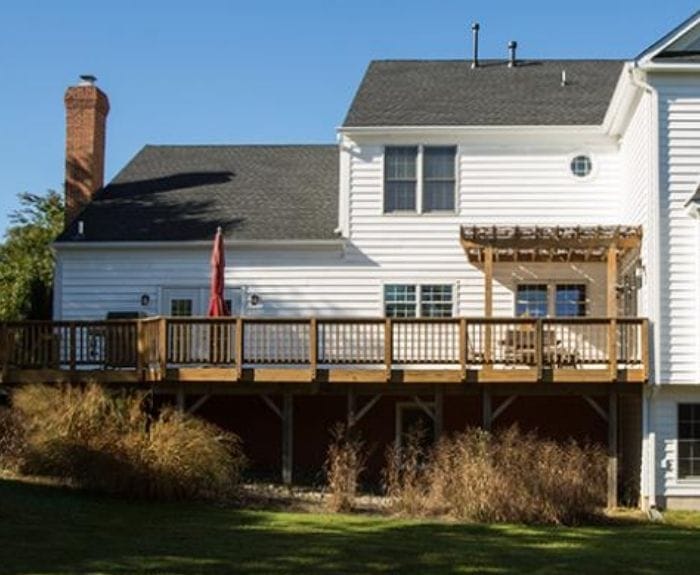
Summer is upon us, and homeowners all over the metro DC area are flocking outside to soak up some sunshine. Of course, one of the best ways to enjoy the great outdoors at home is with an expertly designed, well-crafted deck.
When homeowners plan to build a deck, they first have to decide what material to use — wood or composite. Which one is better for your project? Let’s dive in and see.
Wood Decks

Why we love them:
There’s nothing like the warm, inviting look of a natural wood deck. With several options of wood to choose from — all with different grains and colors, your deck can be a unique focal point in your yard. Though some types of wood cost more than others, wood decks tend to be much more affordable than those made of composite material. Lastly, wood naturally stays cooler on hot summer days, leaving you free to walk barefoot.
The drawbacks:
Of course, that all-natural look comes with its challenges. After exposure to the elements, the protective stain on wood decks wears off, requiring sanding or pressure washing, restaining, and sealing every few years. While the stain provides some protection, wood is still susceptible to insects and rot. Homeowners could be faced with the need to replace entire boards if they are damaged beyond repair. Even after keeping up with routine maintenance, a wood deck generally has a shorter lifespan than a composite deck — usually lasting about 10-15 years.
Composite Decks

Why we love them:
The biggest reason homeowners request composite decking is the worry-free assurance of low maintenance and longevity. Composite decking will maintain its look and splinter-free feel for 25-30 years, with only an occasional cleaning and sweeping of debris required. Furthermore, since it is resistant to insects and rot, the chances of you needing to replace boards are very low.
The drawbacks:
While a composite deck does come at a higher price, the long-term benefits are worth the initial investment. Although this material is easier to take care of, it won’t have that “all-natural look” that many homeowners enjoy — sometimes appearing monotonous and artificial. Furthermore, composite decking tends to heat up faster than wood and can be slippery when wet.
So which deck material is better? In the end, you’ll need to decide that for yourself based on your personal preferences and priorities. No matter which type of deck material you choose, Tabor can help. Contact us with any questions or to start planning your outdoor oasis.



